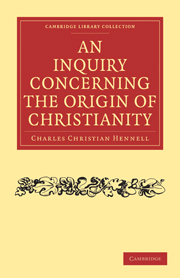Book contents
- Frontmatter
- PREFACE
- Contents
- ERRATA
- CHAPTER I Historical sketch, from the Babylonish captivity to the death of Jesus
- CHAPTER II Historical sketch, continued to the end of the first century
- CHAPTER III On the date and credibility of the Gospel of Matthew
- CHAPTER IV On the date and credibility of the Gospel of Mark
- CHAPTER V On the date and credibility of the Gospel of Luke
- CHAPTER VI On the date and credibility of the Gospel of John
- CHAPTER VII Examination of the accounts of the Resurrection and Ascension
- CHAPTER VIII Remarks on the other miracles in the four Gospels
- CHAPTER IX General objections to the miracles of Jesus
- CHAPTER X Remarks on the miracles in the Acts of the Apostles
- CHAPTER XI On the evidence afforded to the miracles by the apostolic writings
- CHAPTER XII On the prophecies
- CHAPTER XIII On the parts of Isaiah supposed to relate to Christ
- CHAPTER XIV On the book of Daniel
- CHAPTER XV Whether Jesus foretold his own death and resurrection
- CHAPTER XVI On the character, views, and doctrine of Jesus
- CHAPTER XVII Comparison of the precepts of Jesus with the Jewish writings
- CHAPTER XVIII Concluding reflections
- APPENDIX
CHAPTER XIII - On the parts of Isaiah supposed to relate to Christ
Published online by Cambridge University Press: 05 March 2012
- Frontmatter
- PREFACE
- Contents
- ERRATA
- CHAPTER I Historical sketch, from the Babylonish captivity to the death of Jesus
- CHAPTER II Historical sketch, continued to the end of the first century
- CHAPTER III On the date and credibility of the Gospel of Matthew
- CHAPTER IV On the date and credibility of the Gospel of Mark
- CHAPTER V On the date and credibility of the Gospel of Luke
- CHAPTER VI On the date and credibility of the Gospel of John
- CHAPTER VII Examination of the accounts of the Resurrection and Ascension
- CHAPTER VIII Remarks on the other miracles in the four Gospels
- CHAPTER IX General objections to the miracles of Jesus
- CHAPTER X Remarks on the miracles in the Acts of the Apostles
- CHAPTER XI On the evidence afforded to the miracles by the apostolic writings
- CHAPTER XII On the prophecies
- CHAPTER XIII On the parts of Isaiah supposed to relate to Christ
- CHAPTER XIV On the book of Daniel
- CHAPTER XV Whether Jesus foretold his own death and resurrection
- CHAPTER XVI On the character, views, and doctrine of Jesus
- CHAPTER XVII Comparison of the precepts of Jesus with the Jewish writings
- CHAPTER XVIII Concluding reflections
- APPENDIX
Summary
The Jewish sacred writings were burnt or dispersed at the time of the captivity, and afterwards collected together again, as is generally agreed, by Ezra. In the second book of Maccabees we read that “Nehemiah founded a library, and gathered together the acts of the kings, and the prophets, and of David, and the epistles of the kings, (about 445 B. C.,) concerning the holy gifts,” 2 Macc. ii. 13. This collection was doubtless that made by Ezra the priest, who was more qualified for such a task than the viceroy himself, and it appears to have been the first regular compilation of the Prophets and Psalms. But since Nehemiah or Ezra had to deal with a miscellaneous collection, written at different times within the six centuries before their time, it is probable that there were some pieces of which they could not ascertain the exact date or authorship, and which consequently they might have placed under a wrong name. Between the time of Ezra and that of the Septuagint translation, (B.C. 277,) it is allowed that the Jews were careless about the custody and transcription of their sacred books. Josephus, in his account of the Septuagint, makes Ptolemy's librarian say to the king, “And I let you know that we want the books of the Hebrew legislation, with some others; for they are written in the Hebrew characters, and are to us unknown. It hath also happened to them that they have been transcribed more carelessly than they should have been, because they have not had hitherto royal care taken about them.”
- Type
- Chapter
- Information
- An Inquiry Concerning the Origin of Christianity , pp. 243 - 260Publisher: Cambridge University PressPrint publication year: 2010First published in: 1838



